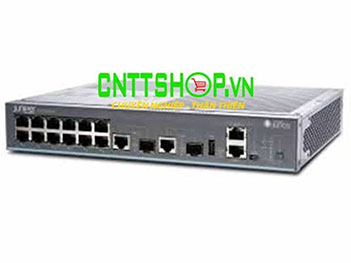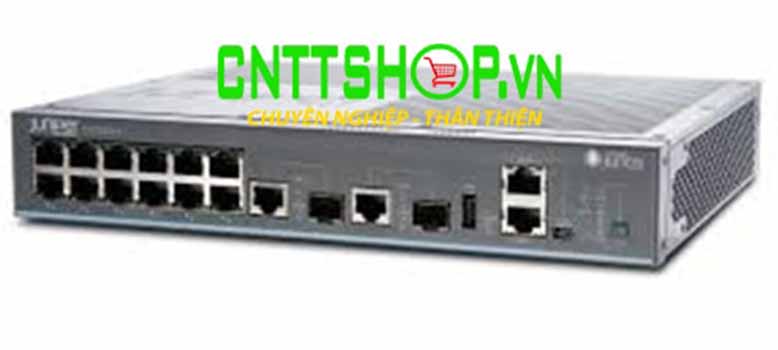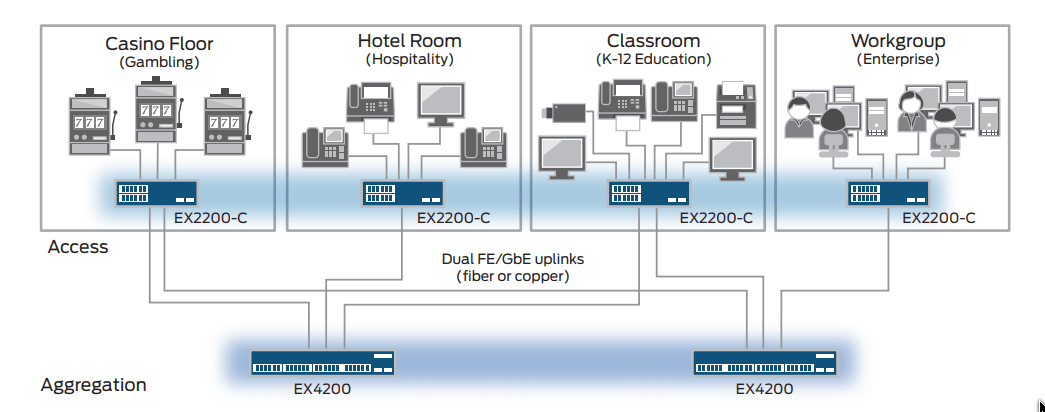| Physical Specifications |
| Dimensions (W x H x D) |
10.6 x 1.75 x 9.4 in (26.9 x 4.4 x 23.8 cm) |
| Weight |
6.4 lb |
| Environmental Ranges |
• Operating temperature: 32° to 104° F (0° to 40° C)1
• Storage temperature: -40° to 158° F (-40° to 70° C)
• Operating altitude: up to 5,000 ft (1,524 m)2
• Non-operating altitude: up to 16,000 ft (4,877 m)
• Relative humidity operating: 10% to 85% (noncondensing)
• Relative humidity non-operating: 0% to 95% (noncondensing) |
| Power Options |
180 W AC |
| Total PoE Power Budget |
100 W |
| Hardware Specifications |
| Switching Engine Model |
Store and forward |
| DRAM |
512 MB |
| Flash |
1 GB |
| CPU |
800 MHz ARM CPU |
| GbE port density per system |
14 (12 access ports + 2 uplink ports) |
| Physical Layer |
• Physical port redundancy: Redundant Trunk Group (RTG)
• Time-domain reflectometry (TDR) for detecting cable breaks and shorts
• Auto medium-dependent interface/medium-dependent interface crossover (MDI/MDIX) support
• Port speed downshift/setting maximum advertised speed on 10/100/1000BASE-T ports
• Digital optical monitoring for optical ports |
| Packet Switching Capacities |
28 Gbps |
| Layer 2 Throughput (Mpps) |
21 Mpps (wire speed) |
| Layer 2 Switching |
• Maximum MAC addresses in hardware: 16,000
• Jumbo frames: 9216 bytes
• Number of VLANs: 1,024 (VLAN IDs: 4,096)
• Port-based VLAN
• MAC-based VLAN
• Voice VLAN
• Private VLAN (PVLAN)
• IEEE 802.1ak: Multiple VLAN Registration Protocol (MVRP)
• Multicast VLAN Registration (MVR)
• Compatible with Per-VLAN Spanning Tree Plus (PVST+)
• RVI (Routed VLAN Interface)
• IEEE 802.1AB: Link Layer Discovery Protocol (LLDP)
• LLDP-MED with VoIP integration
• IEEE 802.1D: Spanning Tree Protocol
• IEEE 802.1p: CoS prioritization
• IEEE 802.1Q: VLAN tagging
• IEEE 802.1Q-in-Q: VLAN Stacking
• IEEE 802.1s: Multiple Spanning Tree Protocol (MSTP)
• Number of MST instances supported: 64
• IEEE 802.1w: Rapid Spanning Tree Protocol (RSTP)
• IEEE 802.1X: Port Access Control
• IEEE 802.3: 10BASE-T
• IEEE 802.3u: 100BASE-T
• IEEE 802.3ab: 1000BASE-T
• IEEE 802.3af: PoE
• IEEE 802.3at: PoE+
• IEEE 802.3z: 1000BASE-X
• IEEE 802.3x: Pause Frames/Flow Control
• IEEE 802.3ad: Link Aggregation Control Protocol (LACP)
• IEEE 802.3ah: Ethernet in the First Mile
• IEEE 802.1ag: Connectivity Fault Management (CFM)
• G.8032 (Ethernet Ring Protection) |
| Layer 3 Features: IPv4 |
• Maximum number of Address Resolution Protocol (ARP) entries: 2,000
• Maximum number of IPv4 unicast routes in hardware: 6,500
• Routing protocols:
• RIP v1/v2
• OSPF v1/v2 (with 4 active interfaces)
• Static routing
• Routing policy
• Bidirectional Forwarding Detection (BFD)
• IP directed broadcast
• VRF-Lite |
| Layer 3 Features: IPv6 Management Functionality |
• Neighbor discovery, system logging, telnet, SSH, SNMP, Network Time Protocol (NTP), Domain Name System (DNS)
• Static routing |
| Security |
• MAC limiting
• Allowed MAC addresses—configurable per port
• Sticky MAC (persistent MAC address learning)
• Dynamic ARP inspection (DAI)
• Proxy ARP
• Static ARP support
• DHCP snooping
• IP source guard
• 802.1X port-based
• 802.1X multiple supplicants
• 802.1X with VLAN assignment
• 802.1X with authentication bypass access (based on host MAC address)
• 802.1X with VoIP VLAN support
• 802.1X dynamic access control list (ACL) based on RADIUS attributes
• 802.1X Supported EAP types: Message Digest 5 (MD5), Transport Layer Security (TLS), Tunneled Transport LayerSecurity (TTLS), Protected Extensible Authentication Protocol (PEAP)
• Captive Portal
• Static MAC authentication
• MAC-RADIUS
• Fallback Authentication
• Trusted Network Connect (TNC) certified
• Control plane DoS protection |
| Access control lists (ACLs) (Junos OS firewall filters) |
• Port-based ACL (PACL)—ingress
• VLAN-based ACL (VACL)—ingress and egress
• Router-based ACL (RACL)—ingress and egress
• ACL entries (ACE) in hardware per system: 1,500
• ACL counter for denied packets
• ACL counter for permitted packets
• Ability to add/remove/change ACL entries in middle of list (ACL editing)
• L2-L4 ACL |
| High Availability |
• Link Aggregation
• 802.3ad (LACP) support:
- Number of LAGs supported: 32
- Maximum number of ports per LAG: 8
• LAG load sharing algorithm—Bridged Unicast Traffic:
- IP: S/D MAC, S/D IP
- TCP/UDP: S/D MAC, S/D IP, S/D Port
- Non-IP: S/D MAC
• LAG sharing algorithm—Routed Unicast Traffic:
- IP: S/D IP
- TCP/UDP: S/D IP, S/D Port
• LAG load sharing algorithm—Bridged Multicast Traffic:
- IP: S/D MAC, S/D IP
- TCP/UDP: S/D MAC, S/D IP, S/D Port
- Non-IP: S/D MAC
• LAG sharing algorithm—Routed Multicast Traffic:
- IP: S/D IP
- TCP/UDP: S/D IP, S/D Port
• Tagged ports support in LAG
• Uplink Failure Detection (UFD) |
| Quality of Service (QoS) |
• Layer 2 QoS
• Layer 3 QoS
• Ingress policing: 1 rate 2 color
• Hardware queues per port: 8
• Scheduling methods (egress): Strict Priority (SP), shaped deficit weighted round-robin (SDWRR)
• 802.1p, DSCP /IP precedence trust and marking
• L2-L4 classification criteria: Interface, MAC address, Ethertype, 802.1p, VLAN, IP address, DSCP/IP precedence, TCP/UDP port numbers
• Congestion avoidance capabilities: Tail drop |
| Multicast |
• IGMP snooping entries: 1,000
• IGMP: v1, v2, v3
• IGMP snooping
• PIM-SM, PIM-SSM, PIM-DM |
| Safety Certifications |
• UL-UL60950-1 (Second Edition)
• C-UL to CAN/CSA 22.2 No.60950-1 (Second Edition)
• TUV/GS to EN 60950-1 (Second Edition)
• CB-IEC60950-1 (Second Edition with all country deviations)
• EN 60825-1 (Second Edition) |
| Electromagnetic Compatibility Certifications |
• FCC 47CFR Part 15 Class A
• EN 55022 Class A
• ICES-003 Class A
• VCCI Class A
• AS/NZS CISPR 22 Class A
• CISPR 22 Class A
• EN 55024
• EN 300386
• CE |
| NEBS |
• GR-63-Core: NEBS, Physical Protection
• GR-1089-Core: EMC and Electrical Safety for Network Telecommunications Equipment
• All models except EX2200-24P-4G, EX2200-48P-4G and EX2200-24T-4G-DC |
| Acoustic Noise in DBA |
• 0 db (fanless)
• Noise measurements based on operational tests taken from bystander position (front) and performed at 25° C in compliance with ISO 7779 |
 Switch
Switch Wifi - Access Point
Wifi - Access Point Firewall
Firewall Router
Router Module Quang
Module Quang![Module Quang Cisco]() Module Quang Cisco
Module Quang Cisco![Module quang HPE]() Module quang HPE
Module quang HPE![Module quang Maipu]() Module quang Maipu
Module quang Maipu![Module quang Brocade]() Module quang Brocade
Module quang Brocade![Module quang Fortinet]() Module quang Fortinet
Module quang Fortinet![Module quang Aruba]() Module quang Aruba
Module quang Aruba![Module quang OEM]() Module quang OEM
Module quang OEM![Module quang Juniper]() Module quang Juniper
Module quang Juniper![Module quang Dell]() Module quang Dell
Module quang Dell![Module quang Palo Alto]() Module quang Palo Alto
Module quang Palo Alto![Module quang Huawei]() Module quang Huawei
Module quang Huawei![Module quang Arista]() Module quang Arista
Module quang Arista![Module quang F5]() Module quang F5
Module quang F5![Module quang H3C]() Module quang H3C
Module quang H3C![Module Quang Allied Telesis]() Module Quang Allied Telesis
Module Quang Allied Telesis![Module quang SonicWall]() Module quang SonicWall
Module quang SonicWall![Module quang Mikrotik]() Module quang Mikrotik
Module quang Mikrotik![Module quang Handar]() Module quang Handar
Module quang Handar Máy chủ (Server)
Máy chủ (Server) Thiết bị lưu trữ (SAN, NAS)
Thiết bị lưu trữ (SAN, NAS) Load Balancing
Load Balancing Video Conferencing
Video Conferencing Phụ kiện máy chủ
Phụ kiện máy chủ Thiết Bị IoT
Thiết Bị IoT Phụ Kiện Mạng
Phụ Kiện Mạng




.png)

























 Mô hình mạng sử dụng Switch Juniper EX2200-C-12P-2G
Mô hình mạng sử dụng Switch Juniper EX2200-C-12P-2G





Bạn đang cần tư vấn về sản phẩm: EX2200-C-12P-2G ?